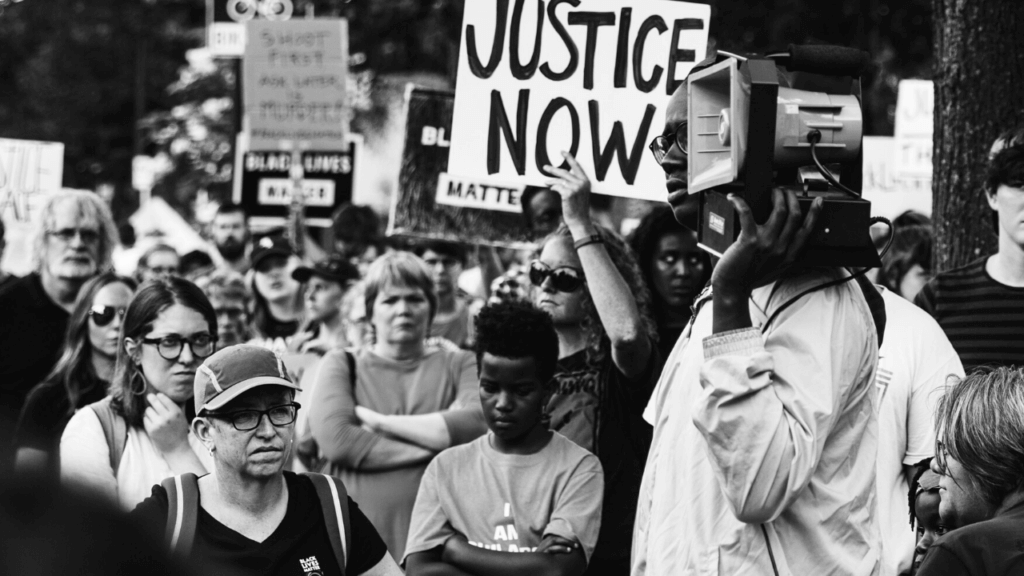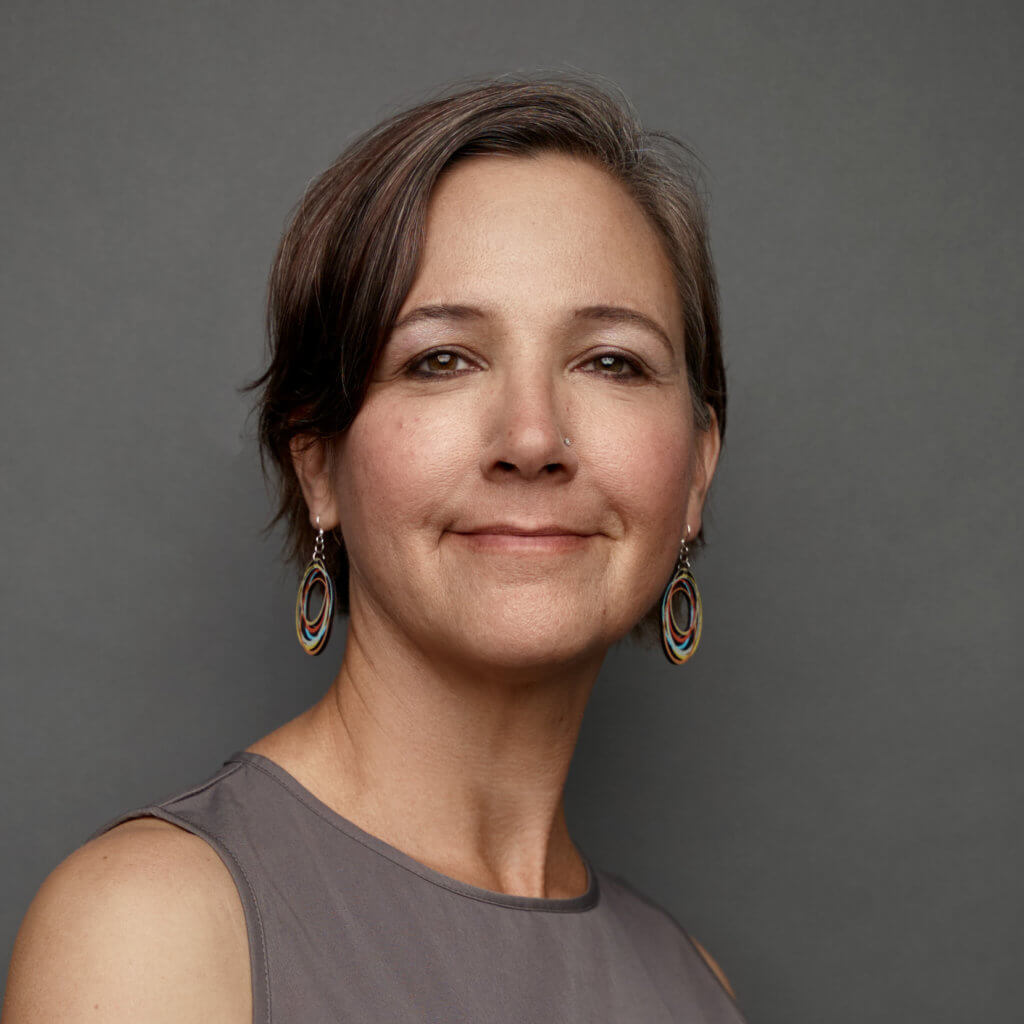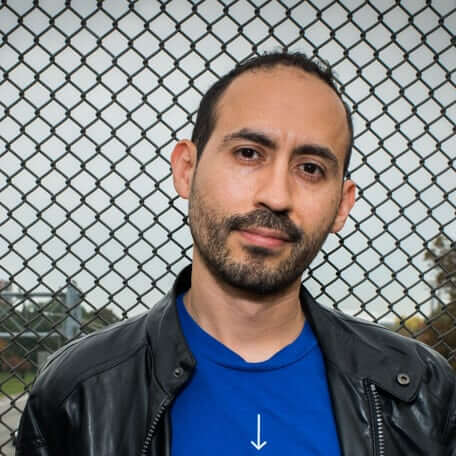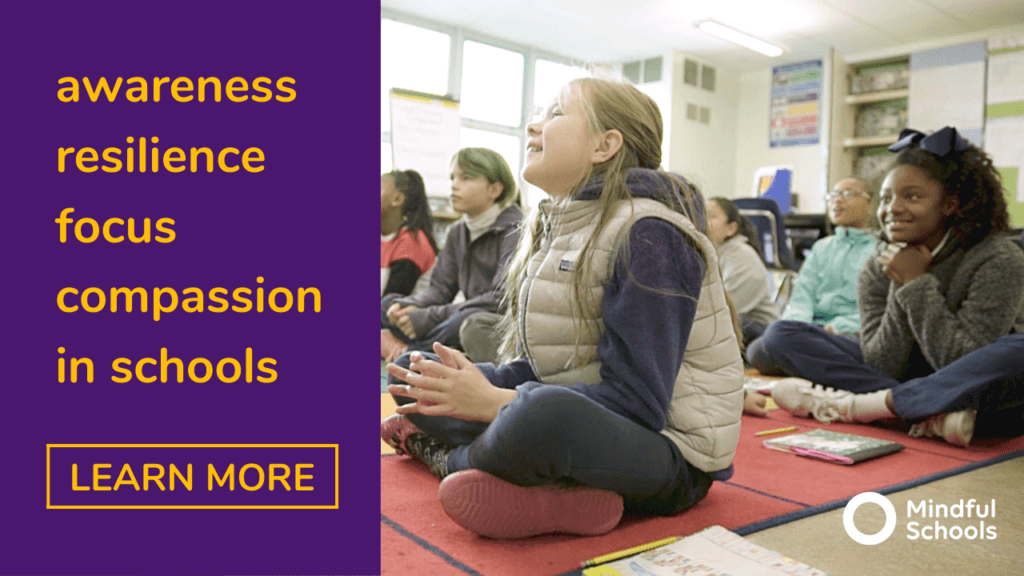Article co-written by Megan Sweet, Director of Training at Mindful Schools, and Argos Gonzalez, Lead Teacher of Mindful Schools’ Mindful Teacher Certification Program.
In the wake of the killing of George Floyd and the resulting nationwide protests, many of us are challenged with making sense of our grief and loss – both for ourselves, and with the children in our lives. Mindfulness can be a tool to develop awareness and compassion so we are resourced to take action to address racism and injustice. Listen to a 10-minute mindfulness practice, guided by Argos Gonzalez.

This week, in the wake of the killing of George Floyd and the resulting nationwide protests, we may be experiencing a barrage of news, visuals, and emotions. Many of us are challenged with making sense of our grief and loss, all while grappling with an invisible virus that is having a profound impact on all of our lives. We are tired, some communities more than others given what they have been carrying. When this recent barrage on social media dies down, those of us with privilege will have a choice to make–do we continue to open ourselves to see and confront the inequities in our country, or do we retreat back to the relative comfort of our lives? Others will not enjoy that option. They will continue to live with the daily fear that they or their loved ones could be the next victim. They will continue to experience the oppression that our system imposes on them based on the color of their skin.
The events of the past few weeks are the most current demonstration that people of color, since before the country’s inception, have suffered from racist and biased policies and acts of violence. Dr. Lisa Delpit is a professor and researcher who has been studying and writing about the dynamics of race and culture in the classroom for decades. In her book, Multiplication is for White People, Delpit aptly describes America’s challenge when she says:
“The problem is that the cultural framework of our country has, almost since its inception, dictated that ‘black’ is bad and less than and in all arenas ‘white’ is good and superior. This perspective is so ingrained and so normalized that we all stumble through our days with eyes closed to avoid seeing it. [As such], we miss the pain in our children’s eyes when they have internalized the societal belief that they are dumb, unmotivated, and disposable” (2012, pp xvii-xviii).
The recent killings of George Floyd, Breonna Taylor, and Ahmaud Arbery are painful reminders of the grip that white supremacy, and the United States’ history of oppression of black, brown, and indigenous bodies, is alive and well. Given the wave of particularly visible injustices arising this week, one might ask what role mindfulness plays in our quest for justice and peace in the world.
Article continues below
Change the future of education. Educators, explore how to bring mindfulness to your K-12 classroom.
Ruth King, an international insight meditation teacher and leadership coach of diversity awareness says that “racism is a heart disease. How we think and respond is at the core of racial suffering and racial healing. If we cannot think clearly and respond wisely, we will continue to damage the world’s heart” (Mindful of Race: Transforming Race from the Inside Out, 2018, pg. 4). Healing the world’s heart begins with healing our own. For us to create a meaningful change and a more equitable society, we need to learn about bias, how it shows up for us, and how it’s influencing our viewpoints and actions. We also need to learn to attend to our feelings, to acknowledge our experiences of trauma, and begin to heal.
This is where mindfulness comes in.
Mindfulness helps us understand how these injustices at any time, and in particular during a pandemic, can overwhelm us, trigger us, and cause us pain. Mindfulness helps us feel compassion so we are motivated to make room for healing, connection, and action. It helps us to stay with what is arising–to look towards rather than away from what is happening and to be of service and action in the ways we are able. Mindfulness makes space for us to listen more deeply and to be in community in a way that allows each of us to be seen.

As a white woman and mother, I struggle to reconcile that I benefit from privileges that have allowed so many others to suffer–to see the similarities I share with people whose actions I find unconscionable. Through mindfulness, I have found a safe space to open to my feelings and to acknowledge my own thoughts and biases.
This week, mindfulness is supporting me to sit with my feelings of guilt and shame. My practice is also supporting me to hold space for the suffering in the African American community without trying to distance myself from my responsibility to change it. When this moment recedes from our collective attention, mindfulness will help me to stay aware, to continue to look towards the pain that white supremacy causes, and to stay in conversation about a way through. – Megan Sweet

As a Latinx dad and first-generation immigrant, I have considered how to support my children in making sense of the justifiable outrage being felt right now as another black man, George Floyd, was killed by another white police officer.
I’ve sometimes said mindfulness is better at preventing fires than at putting out fires as a way to explain that it’s hard to ask children (or adults) to be mindful in the middle of strong emotions. You learn to recognize the upswell of challenging feelings before you’re lost in them. But this week, my focus has also been on the ways that mindfulness helps us make sense of those fires and what causes them. As children around the country see buildings engulfed by flames we can help them use mindfulness to name and make sense of the feelings they’re having with compassion for themselves and the communities being impacted by Floyd’s death. – Argos Gonzalez
As an organization dedicated to creating safe and supportive learning environments for youth, Mindful Schools refuses to look away, to ignore the pain that our systems of oppression are causing all of us, especially our youth. We stand with the families that have been impacted by these recent examples of racism in the United States, with all who are affected by COVID-19, and with those who have lost loved ones. We invite you to join us as we use our mindfulness practice to ground us and provide us with the space to meet ourselves with kindness and care. When we practice together, we draw on the strength of our community to provide us with the support we need to move through this moment.
Please join us on Wednesday June 3, as we draw on the strength of our community – to provide the support needed in this moment. Join our LIVE Community Practice for free, here >>
Listen to this 10-minute guided practice.
How can we meet these difficult situations with compassionate hearts? Listen to this guided mindfulness meditation with Argos Gonzalez.
Find resources to support children and students.
Here are two resources for families.
- Talking race with young children: Learn research and tips on how to talk about race with children, from NPR.
- Introducing mindfulness to kids: Access ten free mindfulness classes for kids, from the Mindful Schools team.
Change the future of education.
Learn research-backed K-12 curriculum and strategies to teach mindfulness to your students in the Mindful Educator Essentials course. Next session begins .

Megan Sweet, Director of Training at Mindful Schools, is an experienced Network Lead with a demonstrated history of working in the education management industry. She is skilled in Educational Consulting, Lesson Planning, Educational Technology, Instructional Design, and Curriculum Development. She is also a strong entrepreneurship professional with a Doctor of Education (Ed.D.) focused in Educational Leadership and Administration. Megan Sweet has experience as a school teacher, school and district administrator, and a leader in school transformation. Megan Sweet is also a published author, speaker, and experienced presenter.
Argos Gonzalez, Lead Teacher of Mindful Schools’ Mindful Teacher Certification Program, is a teacher, lecturer, mindfulness teacher and yoga instructor. He has 14 years of experience teaching high school in the Bronx and teaches pre-service and in-service teachers at Hunter College School of Education in NY. Argos is certified through both the Mindful Schools Year-Long Certification Program and Little Flower Yoga (LFY). Argos was a contributing editor to Best Practices for Yoga in Schools, and his work has been featured in national media including NPR and The Atlantic. As a frequent speaker at conferences including the Kripalu Yoga in Schools Symposium, Bridging the Hearts and Minds of Youth, the Omega Mindfulness in Education Conference and the Yoga Service Conference, Argos is an important contributor to the yoga in schools movement and a trusted expert with feet in the yoga, mindfulness, and education worlds. His deep passion for empowering children and adolescents and supporting other educators to do the same, comes through in all aspects of his work.
